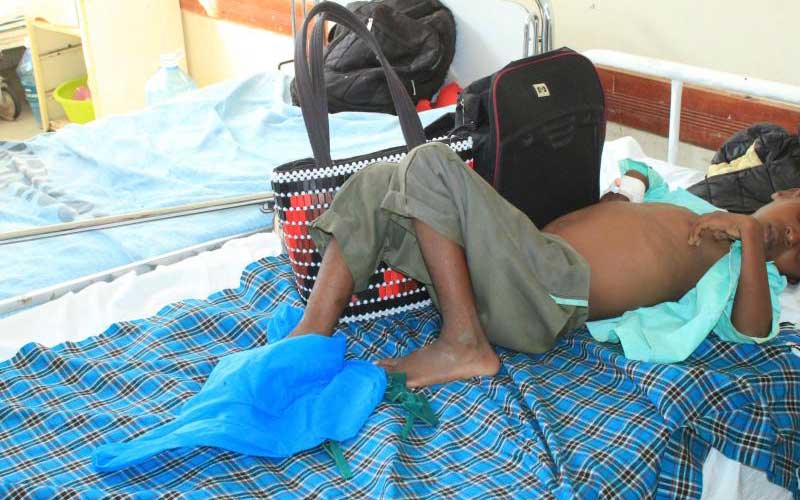
A child from Kitui County who is hospitalised with the disease.
At least 23 people are admitted at Mwingi Level Four Hospital in Kitui County suffering from kala-azar, an outbreak that is currently ravaging parts of Mwingi North.
Fifteen of those receiving treatment at the facility are children under the age of 10 while eight are adults, all diagnosed with the disease.
At the same time, another 13 patients from Mwingi North are also admitted at Garissa Level Five Hospital suffering from the same illness, which has so far claimed the lives of four children in under a month.
Daniel Kimanzi, one of the patients who comes from Kyuso, said before he was brought to the hospital, his body had grown too weak and he could not walk due to constant fatigue. He said the disease struck him in September last year when he started feeling exhausted and developed persistent fever. Treatment at the local dispensaries did not offer relief as his condition worsened.
After several tests at Mwingi Level Four Hospital, Kimanzi who had by now joined a host of other villagers at the facility, was informed he was suffering from kala-azar and immediately put on medication.
“I’m feeling somehow better now. The swelling on my legs has eased and I can walk,” he said.
It is the same case for Mutuku Manzi from Ngomeni ward and Mutooni Mulatya from Masyungwa in Tseikuru ward, who developed similar symptoms late last year. It was not until last week that the patients were admitted at the facility after suffering in the village for months. “This outbreak is very strange. We ask the government to step in with intervention measures the way it is doing for Covid-19,” Mulatya stated.
Some parents have more than one child admitted in the hospital. Elizabeth Mwanziu from Tseikuru lamented that the disease had drained her financially.
“I have a child admitted here and few weeks ago another was discharged. This is a huge financial burden on me,” she complained.
The patients revealed that back home, there were tens of other locals battling the disease especially along the Kitui-Tana River border, but who are too poor to afford medication. They want the government to step in and foot the bills.
“Those affected are so many. Even when I am discharged I have no idea how I will pay the hospital bills. The county and national governments should come and rescue us from this disease,” said Mulatya.
Richard Muthoka, the chief officer in charge of health, revealed that a surveillance team from the county health department was already on the ground to identify the worst affected areas and come up with intervention measures on how to handle the disease outbreak.
The World Health Organisation says fatality rates for kala-azar, if not treated, can be 100 per cent in two years in developing countries.
 The Standard Group Plc is a multi-media organization with investments in media
platforms spanning newspaper print
operations, television, radio broadcasting, digital and online services. The
Standard Group is recognized as a
leading multi-media house in Kenya with a key influence in matters of national
and international interest.
The Standard Group Plc is a multi-media organization with investments in media
platforms spanning newspaper print
operations, television, radio broadcasting, digital and online services. The
Standard Group is recognized as a
leading multi-media house in Kenya with a key influence in matters of national
and international interest.











